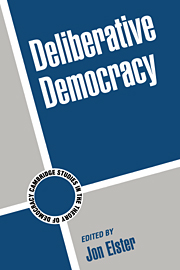Book contents
- Frontmatter
- Contents
- List of Contributors
- Preface and Acknowledgment
- Introduction
- 1 “Claro!”: An Essay on Discursive Machismo
- 2 Deliberation as Discussion
- 3 All Men Are Liars: Is Democracy Meaningless?
- 4 Deliberation and Constitution Making
- 5 Pathologies of Deliberation
- 6 Deliberation and Ideological Domination
- 7 Arguing for Deliberation: Some Skeptical Considerations
- 8 Democracy and Liberty
- 9 Health-Health Trade-offs
- 10 Full Representation, Deliberation, and Impartiality
- Index
Introduction
Published online by Cambridge University Press: 05 June 2012
- Frontmatter
- Contents
- List of Contributors
- Preface and Acknowledgment
- Introduction
- 1 “Claro!”: An Essay on Discursive Machismo
- 2 Deliberation as Discussion
- 3 All Men Are Liars: Is Democracy Meaningless?
- 4 Deliberation and Constitution Making
- 5 Pathologies of Deliberation
- 6 Deliberation and Ideological Domination
- 7 Arguing for Deliberation: Some Skeptical Considerations
- 8 Democracy and Liberty
- 9 Health-Health Trade-offs
- 10 Full Representation, Deliberation, and Impartiality
- Index
Summary
Historical Background
The idea of deliberative democracy, or decision making by discussion among free and equal citizens, is having a revival. During the five months between the initial drafting of the present introduction and the completion of the final version, at least three new books were published on the topic in the United States alone. Largely under the influence of Jürgen Habermas, the idea that democracy revolves around the transformation rather than simply the aggregation of preferences has become one of the major positions in democratic theory.
This development represents, to repeat, a revival rather than an innovation. The idea of deliberative democracy and its practical implementation are as old as democracy itself. Both came into being in Athens in the fifth century B.C. Pericles, in his eulogy of Athens, said:
Our public men have, besides politics, their private affairs to attend to, and our ordinary citizens, though occupied with the pursuits of industry, are still fair judges of public matters; for, unlike any other nation, we regard the citizen who takes no part in these duties not as unambitious but as useless, and we are able to judge proposals even if we cannot originate them; instead of looking on discussion as a stumbling-block in the way of action, we think it an indispensable preliminary to any wise action at all.
(Thucydides 11.40)Yet Athenian democracy was also the birthplace of the tendency to debunk discussion as sophistry or demagoguery.
- Type
- Chapter
- Information
- Deliberative Democracy , pp. 1 - 18Publisher: Cambridge University PressPrint publication year: 1998
- 151
- Cited by

